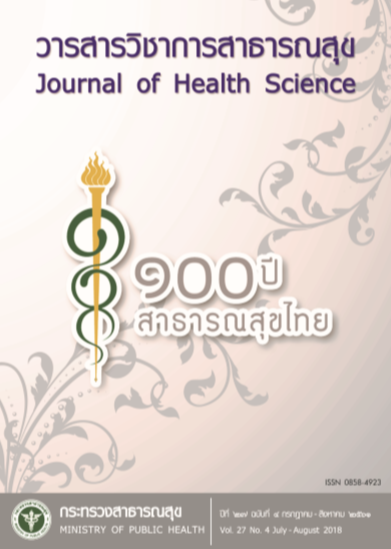ความแม่นยำในการตรวจวินิจฉัยโรคไข้เลือดออกเบื้องต้นกับผลการตรวจยืนยันด้วยวิธีการแยกเชื้อไวรัสด้วยการตรวจหาแอนติบอดีชนิดเอ็มและจีด้วยวิธีอิไลซา จังหวัดกระบี่
คำสำคัญ:
ไข้เลือดออก, ปัจจัยที่มีความสัมพันธ์, ความแม่นยำ, การวินิจฉัยบทคัดย่อ
ไข้เลือดออกเป็นโรคที่มีการระบาดในจังหวัดกระบี่และมีอัตราการป่วยเป็นอันดับต้น ๆ ของประเทศไทยอย่าง ต่อเนื่อง จึงได้ทำการวิจัยขึ้นโดยมีวัตถุประสงค์ เพื่อศึกษาสถานการณ์การระบาดของโรคไข้เลือดออก และเพื่อศึกษาประสิทธิผลของการวินิจฉัยโรคไข้เลือดออกในจังหวัดกระบี่ การวิจัยนี้เป็นการวิจัยภาคตัดขวางเชิงพรรณนา โดยรวบรวม ข้อมูลประวัติการป่วยจากแบบบันทึกโรคไข้เลือดออกของกลุ่มตัวอย่างเป็นผู้ป่วยในที่เข้ารับการรักษาที่โรงพยาบาลกระบี่ช่วงปี พ.ศ. 2556 - 2558 จำนวน 343 ราย วิเคราะห์ข้อมูลด้วยสถิติเชิงพรรณนา ทดสอบความสัมพันธ์ของข้อมูลด้วยสถิติสัมประสิทธิ์สหสัมพันธ์ของเพียร์สัน และทดสอบความแม่นยำของการวินิจฉัย การทดสอบความไว ความจำเพาะผลการทำนายให้ผลบวก และผลการทำนายให้ผลลบ ด้วยโปรแกรมวิเคราะห์ข้อมูลทางสถิติสำเร็จรูป ผลการวิจัยพบว่า ผู้ป่วยส่วนใหญ่เป็นเพศหญิง ร้อยละ 52.48 มีอายุเฉลี่ยขณะป่วย 18.89 ปี (+13.71) ส่วนใหญ่มีอายุระหว่าง 5 ถึง 9 ปี ร้อยละ 21.40 รองลงมามีอายุระหว่าง 10-14 ปี ร้อยละ 14.30 ส่วนใหญ่อาศัยอยู่ในเขตอำเภอเมือง สูงถึงร้อยละ 80.47 รองลงมาเป็นอำเภอเหนือคลอง ร้อยละ 9.04 เมื่อจำแนกผู้ป่วยตามชนิดของไข้เลือดออก พบว่า ส่วนใหญ่เป็น dengue hemorrhagic fever (DHF) ร้อยละ 73.18 dengue fever (DF) ร้อยละ 24.78 และเป็น dengue shock syndrome (DSS) ร้อยละ 2.04 จำนวนวันของการป่วย ตั้งแต่ 2 ถึง 12 วัน โดยป่วยเฉลี่ย 5.13+1.44 วันและมีอาการไข้ก่อนรับการรักษาตั้งแต่ 1 ถึง 5 วันโดยเฉลี่ยมีอาการไข้ 1.21+1.38) วันก่อนรับการรักษา จากการ ศึกษาถึงประสิทธิผลของการวินิจฉัยของแพทย์ในการวินิจฉัยเบื้องต้นกับการวินิจฉัยเพื่อยืนยันด้วยวิธีการแยกเชื้อไวรัส ด้วยการตรวจหาแอนติบอดีชนิดเอ็มและจีด้วยวิธีอิไลซา พบว่า ผลการตรวจยืนยันมีค่าความไว ร้อยละ 95.94 มีความจำเพาะ ร้อยละ 83.33 มีผลการทำนายที่ให้ผลบวก ร้อยละ 95.59 มีผลการทำนายให้ผลลบ เท่ากับร้อยละ 84.51และผลการตรวจยืนยันมีความแม่นยำที่ตรงกับการวินิจฉัยเบื้องต้นร้อยละ 93.29 จากผลการวิจัยสรุปได้ว่า การวินิจฉัยเบื้องต้นของแพทย์มีความถูกต้องแม่นยำสูงมาก ผู้ป่วยยิ่งมีอายุมาก การฟื้นตัวยิ่งเร็วขึ้นกว่าผู้ป่วยที่มีอายุน้อย โดย ข้อเสนอแนะที่ได้จากการวิจัยนี้คือ เมื่อผู้ป่วยรู้ตัวว่ามีอาการป่วยควรรีบพบแพทย์ทันทีเพื่อลดความเสี่ยงต่อการ มีภาวะไข้สูง และเม็ดเลือดขาวสูง และผู้ป่วยยิ่งมีอายุน้อย ยิ่งมีโอกาสเสี่ยงต่อภาวะเกล็ดเลือดต่ำ ซึ่งอาจเป็นความเสี่ยงของการเสียชีวิตได้
Downloads
ดาวน์โหลด
เผยแพร่แล้ว
วิธีการอ้างอิง
ฉบับ
บท
การอนุญาต
ลิขสิทธิ์ (c) 2018 Journal of Health Science- วารสารวิชาการสาธารณสุข

This work is licensed under a Creative Commons Attribution-NonCommercial-NoDerivatives 4.0 International License.







